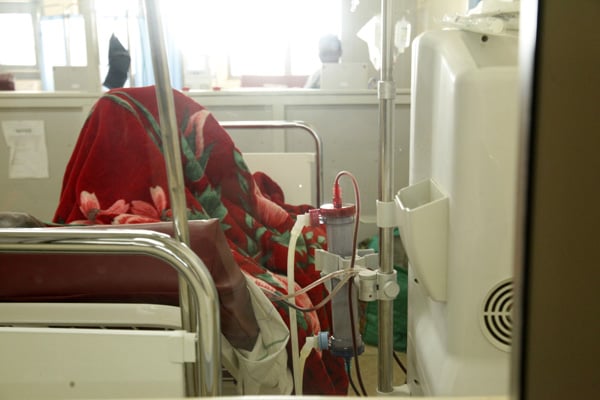Prime
Let’s educate public on kidney disease - doctors

Dialysis technicians attend to patients at Mbarara Regional Referral Hospital last month. PHOTO | JOVITA KYARISIIMA
What you need to know:
- The doctors say there is need to advocate for awareness about the possible risks of getting kidney diseases.
Mr Justus Musinguzi Baryakabona, 38, an agriculture teacher at Rwimi Secondary School in Bunyangabu District, tested positive for hypertension in 2019 and was put on medication, but he kept feeling uncomfortable.
Last year in November, he collapsed on his way to Rwimi Town and the locals took him to Kibito Health Centre IV. At the facility, health workers carried out a renal functional test, which turned out that he was anaemic.
Health workers prescribed medicine for him worth Shs550,000 which he bought from the pharmacies, but again the condition worsened. After a few days, he was put on oxygen before he was referred to Mbarara Regional Referral Hospital for a comprehensive tests on his kidney.
“There was a health worker who came on Friday and Saturday every week at Kibito Health Centre IV. He advised me to go to Mbarara Regional Referral Hospital. On reaching the facility, I was put on dialysis treatment,” he said at the weekend.
Mr Musinguzi said he has spent two months at the hospital and he is subjected to dialysis treatment three times in a week where he spends at least Shs100,000 every time he is put to the dialysis.
“I can now walk around the facility, but I have also incurred a lot of expenses in buying medicine and other equipment. I rented a room somewhere to reduce my expenses on transport. I pray the government will subsidise and ensure that kidney treatment reaches all regions of the country because most of us are poor,” he said.
Dr Grace Kansiime, a physician at Mbarara Regional Referral Hospital, said Mr Musinguzi is among many Ugandans who are not aware of kidney diseases until they are diagnosed.
“What I want people to know is that anyone can get kidney diseases unlike other diseases that are sexually transmitted or diseases for elderly people. Even babies can be born with kidney diseases or a baby can get a kidney disease. An old person, men or women can all get kidney diseases,” she said.
Dr Kansiime said there is need for a campaign to popularise kidney diseases.
“The number of kidney patients has increased and we have realised that the world is aware of other diseases like HIV/Aids, malaria, and tuberculosis, among others, but people are not aware of kidney diseases. We want to advocate for awareness so that those who are at risk of getting kidney disease are helped to seek healthcare on time,” she said.
She said if people are informed about kidney diseases, citizens will laern to reduce the risk factors.
“In Uganda, we have about 500 kidney patients. But at Mbarara Regional Referral Hospital, we diagnose on average 30 patients with chronic kidney disease in a month and conduct almost 15 dialysis sessions per day depending on the time a patient is supposed to seek treatment,” she said.
“Those who come for acute dialysis are on an average of 10 to 15 people monthly and a patient is supposed to seek treatment either twice or thrice a week,” she added.
Dr Kansiime said there are few kidney specialists in the country and most of them are concentrated in Kampala, which forces patients to travel long distances for the services.
“We are only 14 kidney specialists in the country and 12 are in Kampala. Mbarara Hospital has only two with 12 dialysis machines,” she said.
Report
According to a 2022 Report titled Global Dialysis Perspective: Uganda, which was published in the scientific Journal 360, the prevalence of Chronic Kidney disease (CKD) in Uganda ranges from two percent to seven percent and up to 15 percent among patients with HIV or hypertension.




